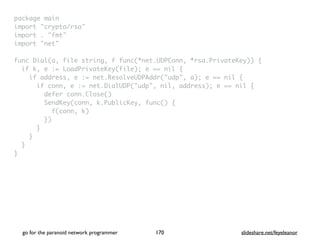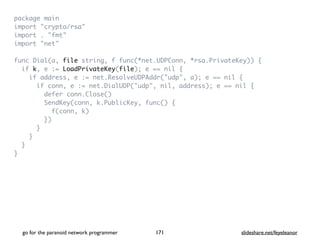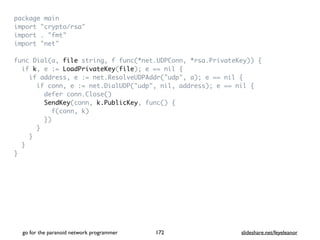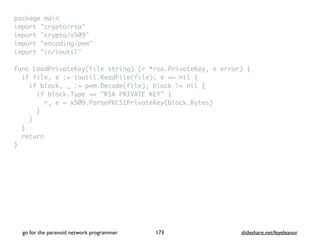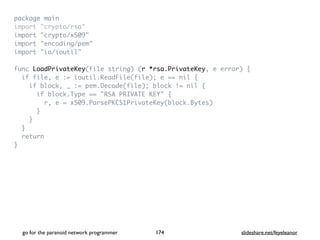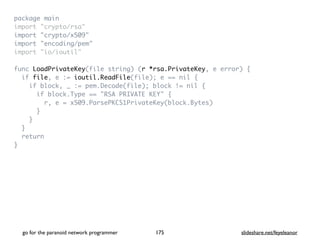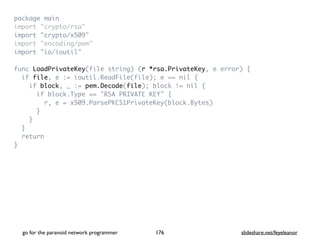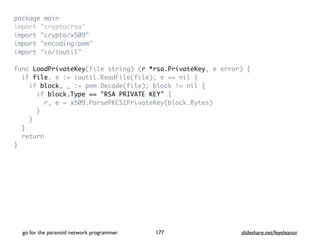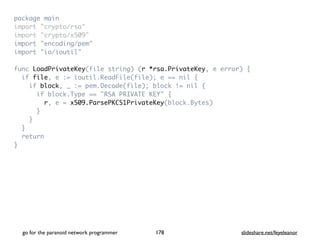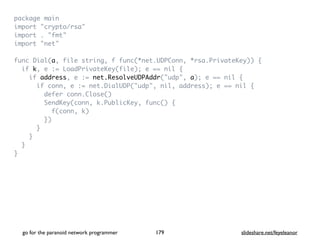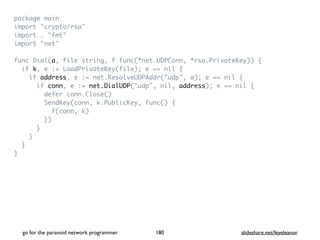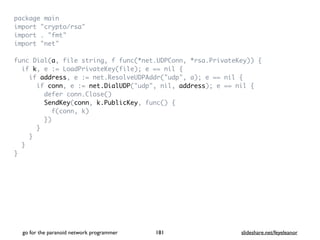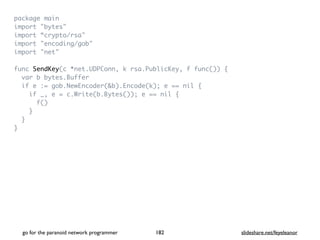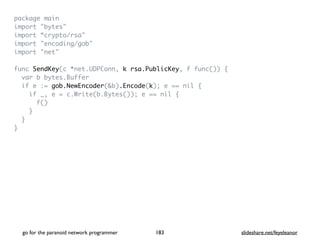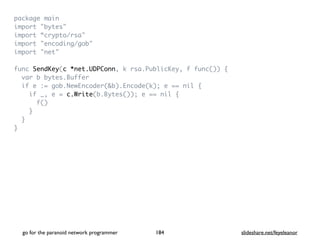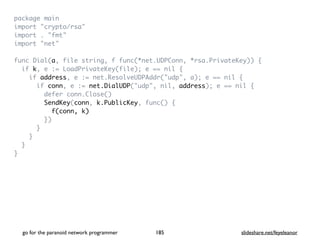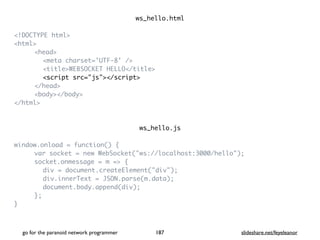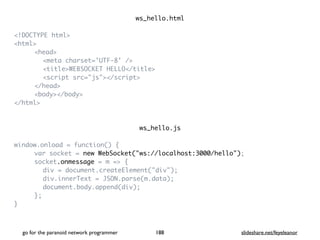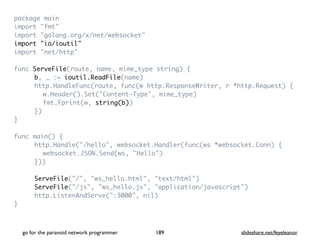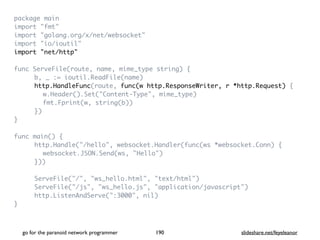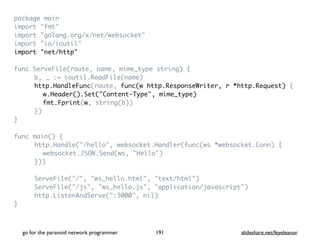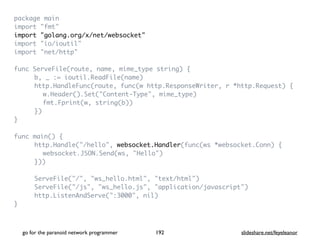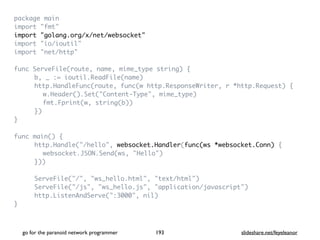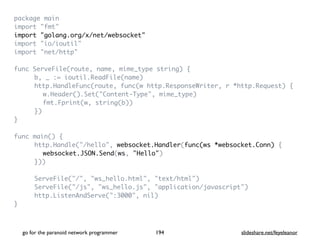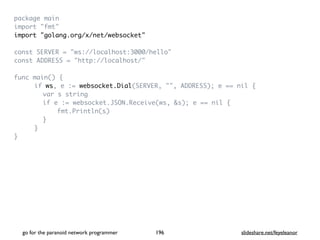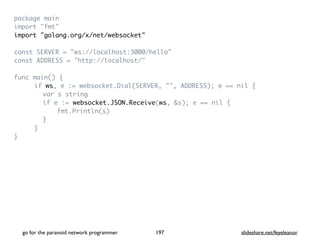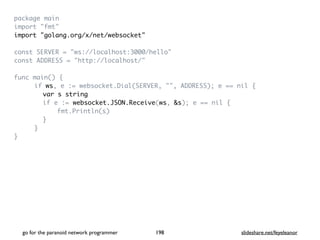The document presents a series of examples for setting up HTTP servers in Go, demonstrating various configurations for handling requests with web sockets and encryption using TLS. It includes sample code for both plaintext and secured HTTP servers, illustrating concurrent server handling and response formatting. Key functions highlighted are for HTTP handling and server lifecycle management using goroutines and synchronization techniques.




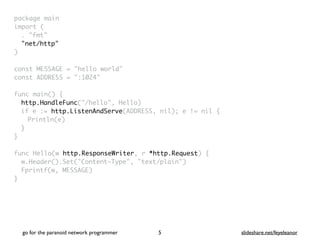
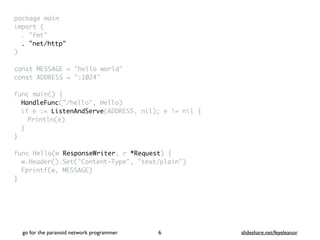
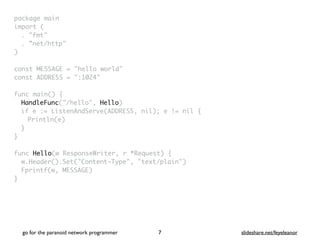
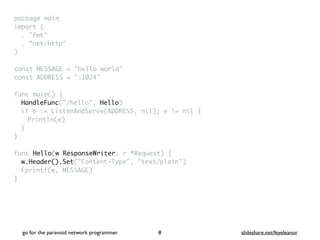

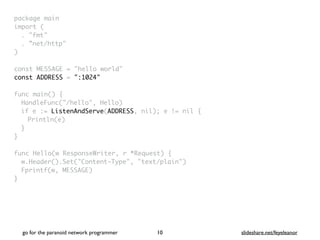
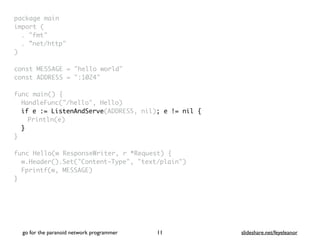
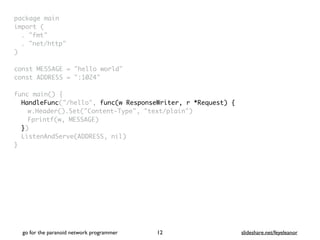
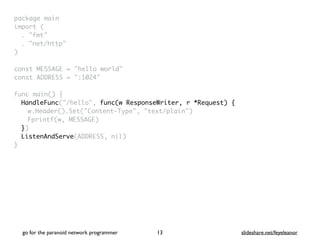

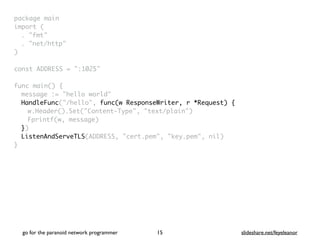
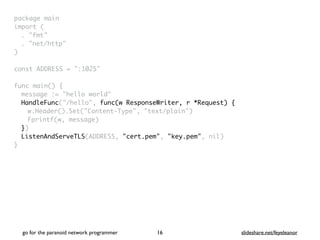
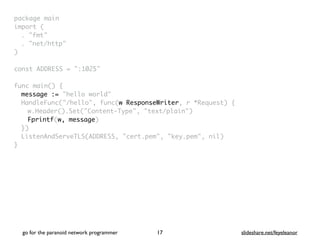
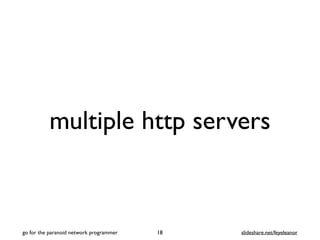
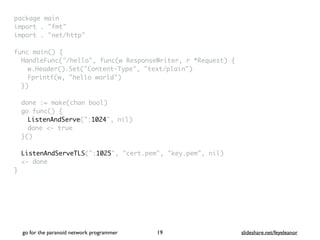
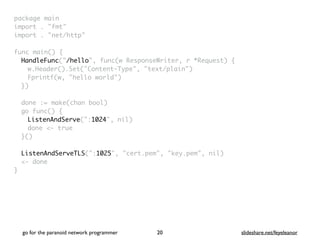
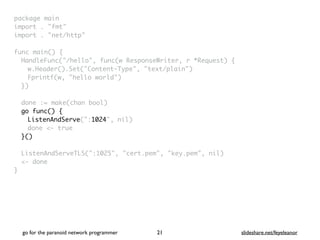
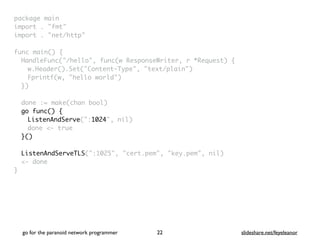
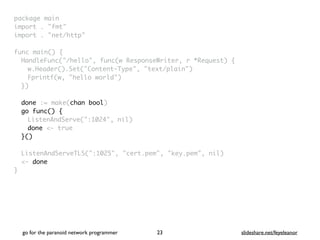
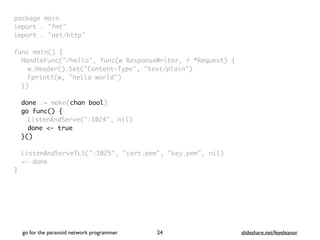
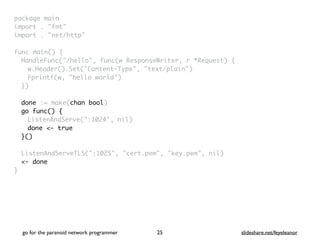
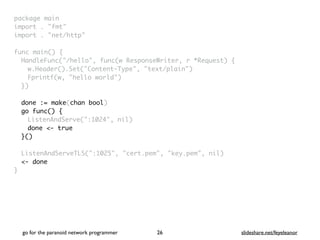
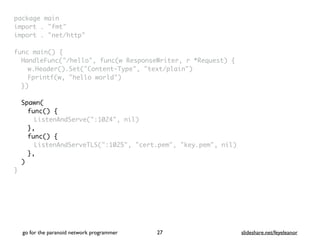
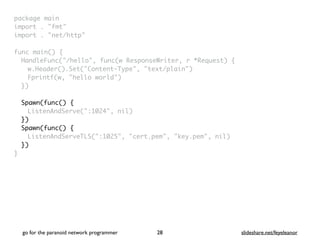




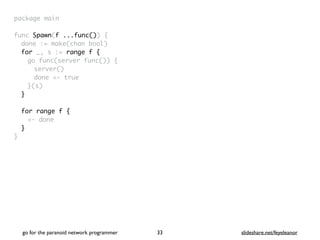






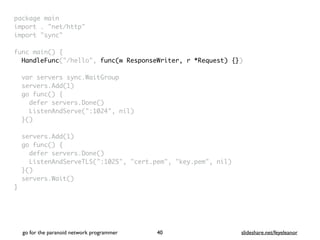
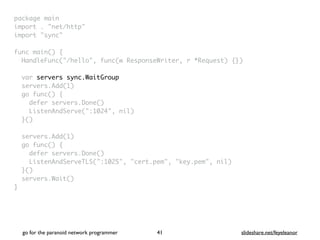
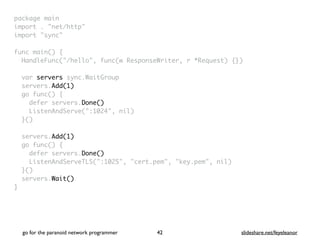
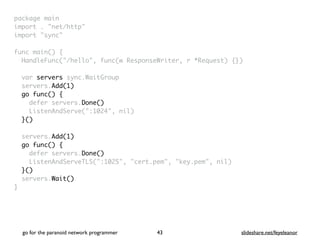
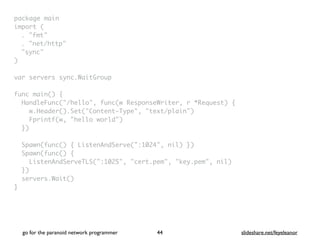
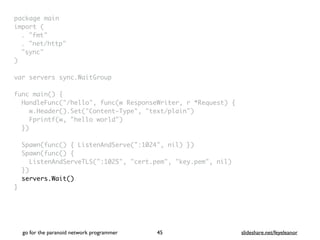
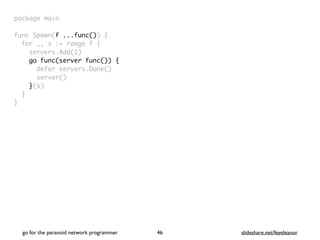
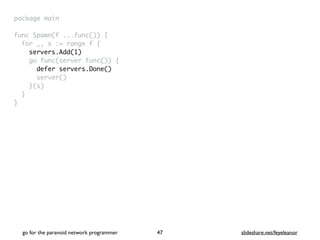

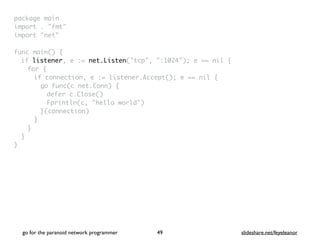
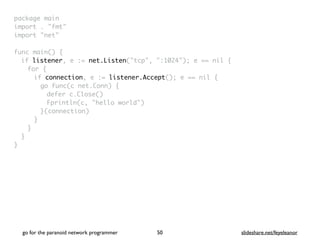
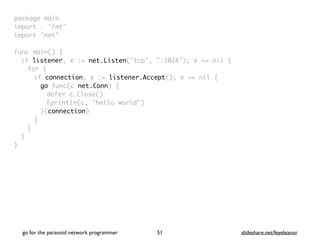
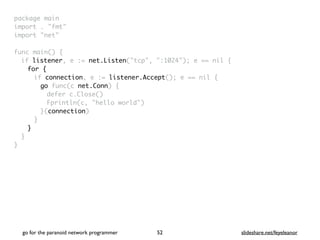
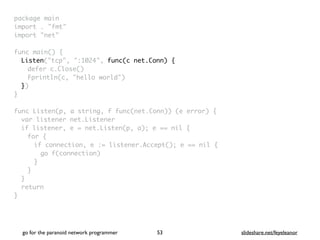
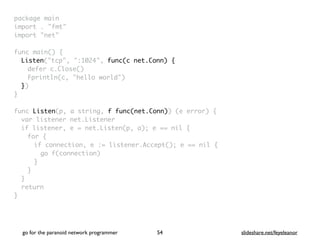
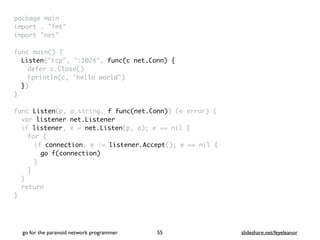
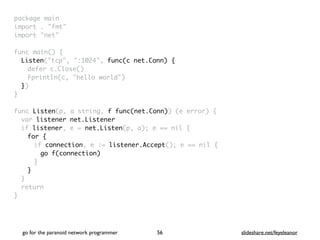

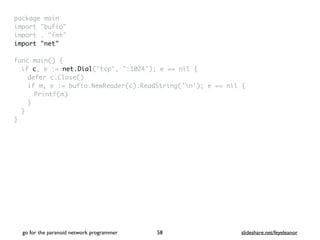
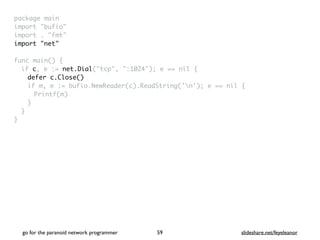
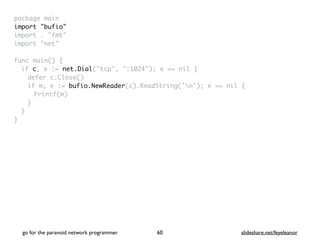
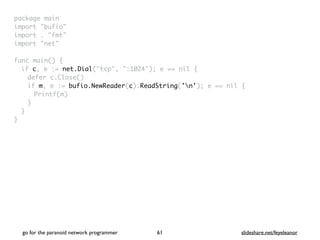
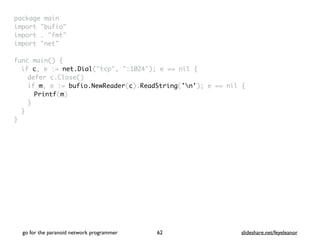
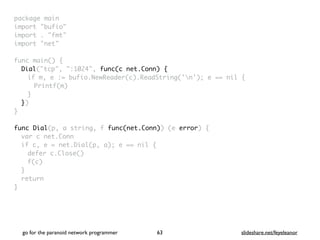
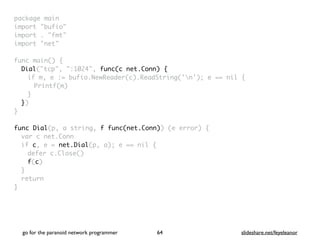
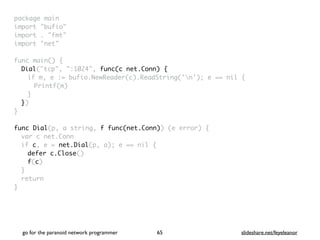

![package mai
n
import "crypto/rand
"
import "crypto/tls
"
import . "fmt
"
func main()
{
Listen(":1025", ConfigTLS("scert", "skey"), func(c *tls.Conn) {
Fprintln(c, "hello world"
)
}
)
}
func ConfigTLS(c, k string) (r *tls.Config)
{
if cert, e := tls.LoadX509KeyPair(c, k); e == nil
{
r = &tls.Config
{
Certificates: []tls.Certificate{ cert }
,
Rand: rand.Reader
,
}
}
retur
n
}
go for the paranoid network programmer slideshare.net/feyeleanor
67](https://image.slidesharecdn.com/gofortheparanoidnetworkprogrammer3rdedition-210218223621/85/Go-for-the-paranoid-network-programmer-3rd-edition-67-320.jpg)
![package mai
n
import "crypto/rand
"
import "crypto/tls
"
import . "fmt
"
func main()
{
Listen(":1025", ConfigTLS("scert", "skey"), func(c *tls.Conn)
{
Fprintln(c, "hello world"
)
}
)
}
func ConfigTLS(c, k string) (r *tls.Config)
{
if cert, e := tls.LoadX509KeyPair(c, k); e == nil
{
r = &tls.Config
{
Certificates: []tls.Certificate{ cert }
,
Rand: rand.Reader
,
}
}
retur
n
}
go for the paranoid network programmer slideshare.net/feyeleanor
68](https://image.slidesharecdn.com/gofortheparanoidnetworkprogrammer3rdedition-210218223621/85/Go-for-the-paranoid-network-programmer-3rd-edition-68-320.jpg)
![package mai
n
import "crypto/rand
"
import "crypto/tls
"
import . "fmt
"
func main()
{
Listen(":1025", ConfigTLS("scert", "skey"), func(c *tls.Conn)
{
Fprintln(c, "hello world"
)
}
)
}
func ConfigTLS(c, k string) (r *tls.Config)
{
if cert, e := tls.LoadX509KeyPair(c, k); e == nil
{
r = &tls.Config
{
Certificates: []tls.Certificate{ cert }
,
Rand: rand.Reader
,
}
}
retur
n
}
go for the paranoid network programmer slideshare.net/feyeleanor
69](https://image.slidesharecdn.com/gofortheparanoidnetworkprogrammer3rdedition-210218223621/85/Go-for-the-paranoid-network-programmer-3rd-edition-69-320.jpg)
![package mai
n
import "crypto/rand
"
import "crypto/tls
"
import . "fmt
"
func main()
{
Listen(":1025", ConfigTLS("scert", "skey"), func(c *tls.Conn)
{
Fprintln(c, "hello world"
)
}
)
}
func ConfigTLS(c, k string) (r *tls.Config)
{
if cert, e := tls.LoadX509KeyPair(c, k); e == nil
{
r = &tls.Config{
Certificates: []tls.Certificate{ cert }
,
Rand: rand.Reader
,
}
}
retur
n
}
go for the paranoid network programmer slideshare.net/feyeleanor
70](https://image.slidesharecdn.com/gofortheparanoidnetworkprogrammer3rdedition-210218223621/85/Go-for-the-paranoid-network-programmer-3rd-edition-70-320.jpg)
![package mai
n
import "crypto/rand
"
import "crypto/tls
"
import . "fmt
"
func main()
{
Listen(":1025", ConfigTLS("scert", "skey"), func(c *tls.Conn)
{
Fprintln(c, "hello world"
)
}
)
}
func ConfigTLS(c, k string) (r *tls.Config)
{
if cert, e := tls.LoadX509KeyPair(c, k); e == nil
{
r = &tls.Config{
Certificates: []tls.Certificate{ cert }
,
Rand: rand.Reader
,
}
}
retur
n
}
go for the paranoid network programmer slideshare.net/feyeleanor
71](https://image.slidesharecdn.com/gofortheparanoidnetworkprogrammer3rdedition-210218223621/85/Go-for-the-paranoid-network-programmer-3rd-edition-71-320.jpg)
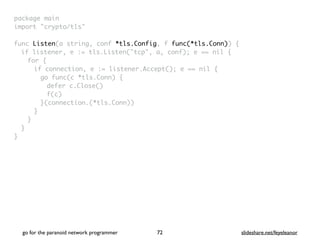
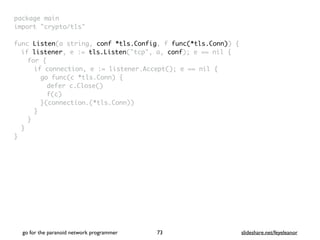
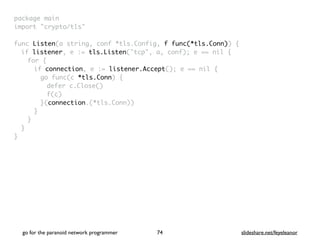

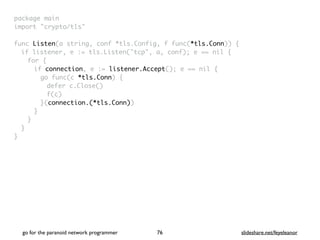
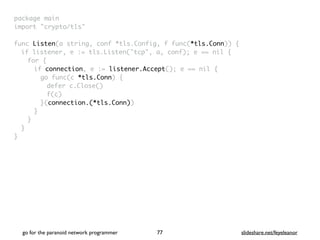
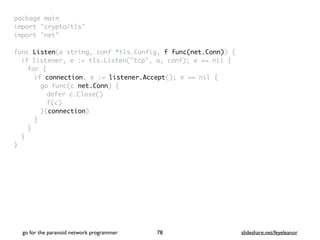
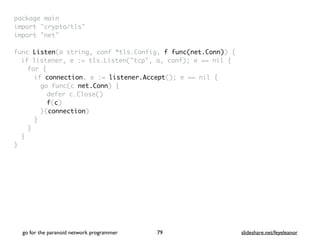
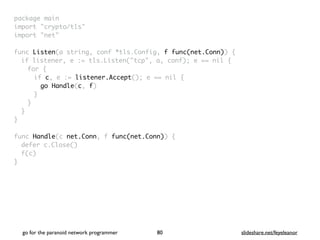

![package mai
n
import "bufio
"
import "crypto/tls
"
import . "fmt
"
import "net
"
func main()
{
Dial(":1025", ConfigTLS("ccert", "ckey"), func(c net.Conn) {
if m, e := bufio.NewReader(c).ReadString('n'); e == nil
{
Printf(m
)
}
}
)
}
func ConfigTLS(c, k string) (r *tls.Config)
{
if cert, e := tls.LoadX509KeyPair(c, k); e == nil
{
r = &tls.Config
{
Certificates: []tls.Certificate{ cert }
,
InsecureSkipVerify: true
,
}
}
go for the paranoid network programmer slideshare.net/feyeleanor
82](https://image.slidesharecdn.com/gofortheparanoidnetworkprogrammer3rdedition-210218223621/85/Go-for-the-paranoid-network-programmer-3rd-edition-82-320.jpg)
![package mai
n
import "bufio
"
import "crypto/tls
"
import . "fmt
"
import "net
"
func main()
{
Dial(":1025", ConfigTLS("ccert", "ckey"), func(c net.Conn) {
if m, e := bufio.NewReader(c).ReadString('n'); e == nil
{
Printf(m
)
}
}
)
}
func ConfigTLS(c, k string) (r *tls.Config)
{
if cert, e := tls.LoadX509KeyPair(c, k); e == nil
{
r = &tls.Config
{
Certificates: []tls.Certificate{ cert }
,
InsecureSkipVerify: true
,
}
}
go for the paranoid network programmer slideshare.net/feyeleanor
83](https://image.slidesharecdn.com/gofortheparanoidnetworkprogrammer3rdedition-210218223621/85/Go-for-the-paranoid-network-programmer-3rd-edition-83-320.jpg)
![package mai
n
import "bufio
"
import "crypto/tls
"
import . "fmt
"
import "net
"
func main()
{
Dial(":1025", ConfigTLS("ccert", "ckey"), func(c net.Conn) {
if m, e := bufio.NewReader(c).ReadString('n'); e == nil
{
Printf(m
)
}
}
)
}
func ConfigTLS(c, k string) (r *tls.Config)
{
if cert, e := tls.LoadX509KeyPair(c, k); e == nil
{
r = &tls.Config
{
Certificates: []tls.Certificate{ cert }
,
InsecureSkipVerify: true
,
}
}
go for the paranoid network programmer slideshare.net/feyeleanor
84](https://image.slidesharecdn.com/gofortheparanoidnetworkprogrammer3rdedition-210218223621/85/Go-for-the-paranoid-network-programmer-3rd-edition-84-320.jpg)
![package mai
n
import "bufio
"
import "crypto/tls
"
import . "fmt
"
import "net
"
func main()
{
Dial(":1025", ConfigTLS("ccert", "ckey"), func(c net.Conn) {
if m, e := bufio.NewReader(c).ReadString('n'); e == nil
{
Printf(m
)
}
}
)
}
func ConfigTLS(c, k string) (r *tls.Config)
{
if cert, e := tls.LoadX509KeyPair(c, k); e == nil
{
r = &tls.Config{
Certificates: []tls.Certificate{ cert }
,
InsecureSkipVerify: true
,
}
}
go for the paranoid network programmer slideshare.net/feyeleanor
85](https://image.slidesharecdn.com/gofortheparanoidnetworkprogrammer3rdedition-210218223621/85/Go-for-the-paranoid-network-programmer-3rd-edition-85-320.jpg)
![package mai
n
import "bufio
"
import "crypto/tls
"
import . "fmt
"
import "net
"
func main()
{
Dial(":1025", ConfigTLS("ccert", "ckey"), func(c net.Conn) {
if m, e := bufio.NewReader(c).ReadString('n'); e == nil
{
Printf(m
)
}
}
)
}
func ConfigTLS(c, k string) (r *tls.Config)
{
if cert, e := tls.LoadX509KeyPair(c, k); e == nil
{
r = &tls.Config{
Certificates: []tls.Certificate{ cert }
,
InsecureSkipVerify: true
,
}
}
go for the paranoid network programmer slideshare.net/feyeleanor
86](https://image.slidesharecdn.com/gofortheparanoidnetworkprogrammer3rdedition-210218223621/85/Go-for-the-paranoid-network-programmer-3rd-edition-86-320.jpg)
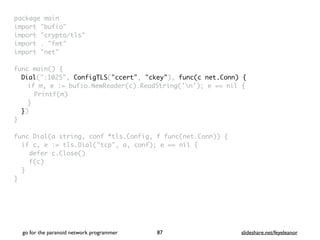
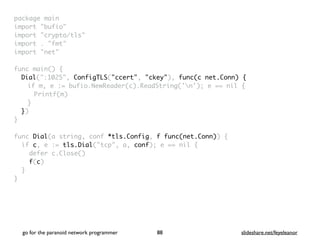

![package mai
n
import "net
"
func main()
{
HELLO_WORLD := []byte("Hello Worldn"
)
Listen(":1024", func(c *net.UDPConn, a *net.UDPAddr, b []byte) {
c.WriteToUDP(HELLO_WORLD, a
)
}
)
}
func Listen(a string, f func(*net.UDPConn, *net.UDPAddr, []byte))
{
if address, e := net.ResolveUDPAddr("udp", a); e == nil
{
if conn, e := net.ListenUDP("udp", address); e == nil
{
for b := make([]byte, 1024); ; b = make([]byte, 1024)
{
if n, client, e := conn.ReadFromUDP(b); e == nil
{
go f(conn, client, b[:n]
)
}
}
}
}
}
go for the paranoid network programmer slideshare.net/feyeleanor
90](https://image.slidesharecdn.com/gofortheparanoidnetworkprogrammer3rdedition-210218223621/85/Go-for-the-paranoid-network-programmer-3rd-edition-90-320.jpg)
![package mai
n
import "net
"
func main()
{
HELLO_WORLD := []byte("Hello Worldn"
)
Listen(":1024", func(c *net.UDPConn, a *net.UDPAddr, b []byte) {
c.WriteToUDP(HELLO_WORLD, a
)
}
)
}
func Listen(a string, f func(*net.UDPConn, *net.UDPAddr, []byte))
{
if address, e := net.ResolveUDPAddr("udp", a); e == nil
{
if conn, e := net.ListenUDP("udp", address); e == nil
{
for b := make([]byte, 1024); ; b = make([]byte, 1024)
{
if n, client, e := conn.ReadFromUDP(b); e == nil
{
go f(conn, client, b[:n]
)
}
}
}
}
}
go for the paranoid network programmer slideshare.net/feyeleanor
91](https://image.slidesharecdn.com/gofortheparanoidnetworkprogrammer3rdedition-210218223621/85/Go-for-the-paranoid-network-programmer-3rd-edition-91-320.jpg)
![package mai
n
import "net
"
func main()
{
HELLO_WORLD := []byte("Hello Worldn"
)
Listen(":1024", func(c *net.UDPConn, a *net.UDPAddr, b []byte) {
c.WriteToUDP(HELLO_WORLD, a
)
}
)
}
func Listen(a string, f func(*net.UDPConn, *net.UDPAddr, []byte))
{
if address, e := net.ResolveUDPAddr("udp", a); e == nil
{
if conn, e := net.ListenUDP("udp", address); e == nil
{
for b := make([]byte, 1024); ; b = make([]byte, 1024)
{
if n, client, e := conn.ReadFromUDP(b); e == nil
{
go f(conn, client, b[:n]
)
}
}
}
}
}
go for the paranoid network programmer slideshare.net/feyeleanor
92](https://image.slidesharecdn.com/gofortheparanoidnetworkprogrammer3rdedition-210218223621/85/Go-for-the-paranoid-network-programmer-3rd-edition-92-320.jpg)
![package mai
n
import "net
"
func main()
{
HELLO_WORLD := []byte("Hello Worldn"
)
Listen(":1024", func(c *net.UDPConn, a *net.UDPAddr, b []byte) {
c.WriteToUDP(HELLO_WORLD, a
)
}
)
}
func Listen(a string, f func(*net.UDPConn, *net.UDPAddr, []byte))
{
if address, e := net.ResolveUDPAddr("udp", a); e == nil
{
if conn, e := net.ListenUDP("udp", address); e == nil
{
for b := make([]byte, 1024); ; b = make([]byte, 1024)
{
if n, client, e := conn.ReadFromUDP(b); e == nil
{
go f(conn, client, b[:n]
)
}
}
}
}
}
go for the paranoid network programmer slideshare.net/feyeleanor
93](https://image.slidesharecdn.com/gofortheparanoidnetworkprogrammer3rdedition-210218223621/85/Go-for-the-paranoid-network-programmer-3rd-edition-93-320.jpg)
![package mai
n
import "net
"
func main()
{
HELLO_WORLD := []byte("Hello Worldn"
)
Listen(":1024", func(c *net.UDPConn, a *net.UDPAddr, b []byte) {
c.WriteToUDP(HELLO_WORLD, a
)
}
)
}
func Listen(a string, f func(*net.UDPConn, *net.UDPAddr, []byte))
{
if address, e := net.ResolveUDPAddr("udp", a); e == nil
{
if conn, e := net.ListenUDP("udp", address); e == nil
{
for b := make([]byte, 1024); ; b = make([]byte, 1024)
{
if n, client, e := conn.ReadFromUDP(b); e == nil
{
go f(conn, client, b[:n]
)
}
}
}
}
}
go for the paranoid network programmer slideshare.net/feyeleanor
94](https://image.slidesharecdn.com/gofortheparanoidnetworkprogrammer3rdedition-210218223621/85/Go-for-the-paranoid-network-programmer-3rd-edition-94-320.jpg)
![package mai
n
import "net
"
func main()
{
HELLO_WORLD := []byte("Hello Worldn"
)
Listen(":1024", func(c *net.UDPConn, a *net.UDPAddr, b []byte)
{
c.WriteToUDP(HELLO_WORLD, a
)
}
)
}
func Listen(a string, f func(*net.UDPConn, *net.UDPAddr, []byte))
{
if address, e := net.ResolveUDPAddr("udp", a); e == nil
{
if conn, e := net.ListenUDP("udp", address); e == nil
{
for b := make([]byte, 1024); ; b = make([]byte, 1024)
{
if n, client, e := conn.ReadFromUDP(b); e == nil
{
go f(conn, client, b[:n]
)
}
}
}
}
}
go for the paranoid network programmer slideshare.net/feyeleanor
95](https://image.slidesharecdn.com/gofortheparanoidnetworkprogrammer3rdedition-210218223621/85/Go-for-the-paranoid-network-programmer-3rd-edition-95-320.jpg)
![package mai
n
import "net
"
func main()
{
HELLO_WORLD := []byte("Hello Worldn"
)
Listen(":1024", func(c *net.UDPConn, a *net.UDPAddr, b []byte)
{
c.WriteToUDP(HELLO_WORLD, a
)
}
)
}
func Listen(a string, f func(*net.UDPConn, *net.UDPAddr, []byte))
{
if address, e := net.ResolveUDPAddr("udp", a); e == nil
{
if conn, e := net.ListenUDP("udp", address); e == nil
{
for b := make([]byte, 1024); ; b = make([]byte, 1024)
{
if n, client, e := conn.ReadFromUDP(b); e == nil
{
go f(conn, client, b[:n]
)
}
}
}
}
}
go for the paranoid network programmer slideshare.net/feyeleanor
96](https://image.slidesharecdn.com/gofortheparanoidnetworkprogrammer3rdedition-210218223621/85/Go-for-the-paranoid-network-programmer-3rd-edition-96-320.jpg)
![package mai
n
import "net
"
func main()
{
HELLO_WORLD := []byte("Hello Worldn"
)
Listen(":1024", func(c *net.UDPConn, a *net.UDPAddr, b []byte)
{
c.WriteToUDP(HELLO_WORLD, a
)
}
)
}
func Listen(a string, f func(*net.UDPConn, *net.UDPAddr, []byte))
{
if address, e := net.ResolveUDPAddr("udp", a); e == nil
{
if conn, e := net.ListenUDP("udp", address); e == nil
{
for b := make([]byte, 1024); ; b = make([]byte, 1024) {
if n, client, e := conn.ReadFromUDP(b); e == nil
{
go f(conn, client, b[:n]
)
}
}
}
}
}
go for the paranoid network programmer slideshare.net/feyeleanor
97](https://image.slidesharecdn.com/gofortheparanoidnetworkprogrammer3rdedition-210218223621/85/Go-for-the-paranoid-network-programmer-3rd-edition-97-320.jpg)
![package mai
n
import "net
"
func main()
{
HELLO_WORLD := []byte("Hello Worldn"
)
Listen(":1024", func(c *net.UDPConn, a *net.UDPAddr, b []byte)
{
c.WriteToUDP(HELLO_WORLD, a
)
}
)
}
func Listen(a string, f func(*net.UDPConn, *net.UDPAddr, []byte))
{
if address, e := net.ResolveUDPAddr("udp", a); e == nil
{
if conn, e := net.ListenUDP("udp", address); e == nil
{
for b := make([]byte, 1024); ; b = make([]byte, 1024) {
if n, client, e := conn.ReadFromUDP(b); e == nil
{
go f(conn, client, b[:n]
)
}
}
}
}
}
go for the paranoid network programmer slideshare.net/feyeleanor
98](https://image.slidesharecdn.com/gofortheparanoidnetworkprogrammer3rdedition-210218223621/85/Go-for-the-paranoid-network-programmer-3rd-edition-98-320.jpg)
![package mai
n
import "net
"
func Listen(a string, f func(*net.UDPConn, *net.UDPAddr, []byte))
{
if address, e := net.ResolveUDPAddr("udp", a); e == nil
{
if conn, e := net.ListenUDP("udp", address); e == nil
{
ServeUDP(conn, func(c *net.UDPAddr, b []byte)
{
f(conn, c, b
)
})
}
}
}
func ServeUDP(c *net.UDPConn, f func(*net.UDPAddr, []byte))
{
for b := make([]byte, 1024); ; b = make([]byte, 1024)
{
if n, client, e := c.ReadFromUDP(b); e == nil
{
go f(client, b[:n]
)
}
}
}
go for the paranoid network programmer slideshare.net/feyeleanor
99](https://image.slidesharecdn.com/gofortheparanoidnetworkprogrammer3rdedition-210218223621/85/Go-for-the-paranoid-network-programmer-3rd-edition-99-320.jpg)
![package mai
n
import "net
"
func Listen(a string, f func(*net.UDPConn, *net.UDPAddr, []byte))
{
if address, e := net.ResolveUDPAddr("udp", a); e == nil
{
if conn, e := net.ListenUDP("udp", address); e == nil
{
ServeUDP(conn, func(c *net.UDPAddr, b []byte)
{
f(conn, c, b
)
})
}
}
}
func ServeUDP(c *net.UDPConn, f func(*net.UDPAddr, []byte))
{
for b := make([]byte, 1024); ; b = make([]byte, 1024) {
if n, client, e := c.ReadFromUDP(b); e == nil
{
go f(client, b[:n]
)
}
}
}
go for the paranoid network programmer slideshare.net/feyeleanor
100](https://image.slidesharecdn.com/gofortheparanoidnetworkprogrammer3rdedition-210218223621/85/Go-for-the-paranoid-network-programmer-3rd-edition-100-320.jpg)
![package mai
n
import "net
"
func Listen(a string, f func(*net.UDPConn, *net.UDPAddr, []byte))
{
if address, e := net.ResolveUDPAddr("udp", a); e == nil
{
if conn, e := net.ListenUDP("udp", address); e == nil
{
ServeUDP(conn, func(c *net.UDPAddr, b []byte)
{
f(conn, c, b
)
})
}
}
}
func ServeUDP(c *net.UDPConn, f func(*net.UDPAddr, []byte))
{
for b := make([]byte, 1024); ; b = make([]byte, 1024) {
if n, client, e := c.ReadFromUDP(b); e == nil
{
go f(client, b[:n]
)
}
}
}
go for the paranoid network programmer slideshare.net/feyeleanor
101](https://image.slidesharecdn.com/gofortheparanoidnetworkprogrammer3rdedition-210218223621/85/Go-for-the-paranoid-network-programmer-3rd-edition-101-320.jpg)
![package mai
n
import "net
"
func Listen(a string, f func(*net.UDPConn, *net.UDPAddr, []byte))
{
if address, e := net.ResolveUDPAddr("udp", a); e == nil
{
if conn, e := net.ListenUDP("udp", address); e == nil
{
ServeUDP(conn, func(c *net.UDPAddr, b []byte)
{
f(conn, c, b
)
})
}
}
}
func ServeUDP(c *net.UDPConn, f func(*net.UDPAddr, []byte))
{
for b := make([]byte, 1024); ; b = make([]byte, 1024) {
if n, client, e := c.ReadFromUDP(b); e == nil
{
go f(client, b[:n]
)
}
}
}
go for the paranoid network programmer slideshare.net/feyeleanor
102](https://image.slidesharecdn.com/gofortheparanoidnetworkprogrammer3rdedition-210218223621/85/Go-for-the-paranoid-network-programmer-3rd-edition-102-320.jpg)
![package mai
n
import "net
"
func Listen(a string, f func(*net.UDPConn, *net.UDPAddr, []byte))
{
if address, e := net.ResolveUDPAddr("udp", a); e == nil
{
if conn, e := net.ListenUDP("udp", address); e == nil
{
ServeUDP(conn, func(c *net.UDPAddr, b []byte)
{
f(conn, c, b
)
})
}
}
}
func ServeUDP(c *net.UDPConn, f func(*net.UDPAddr, []byte))
{
for b := make([]byte, 1024); ; b = make([]byte, 1024) {
if n, client, e := c.ReadFromUDP(b); e == nil
{
go f(client, b[:n]
)
}
}
}
go for the paranoid network programmer slideshare.net/feyeleanor
103](https://image.slidesharecdn.com/gofortheparanoidnetworkprogrammer3rdedition-210218223621/85/Go-for-the-paranoid-network-programmer-3rd-edition-103-320.jpg)
![package mai
n
import "net
"
func Listen(a string, f func(*net.UDPConn, *net.UDPAddr, []byte))
{
if address, e := net.ResolveUDPAddr("udp", a); e == nil
{
if conn, e := net.ListenUDP("udp", address); e == nil
{
ServeUDP(conn, func(c *net.UDPAddr, b []byte)
{
f(conn, c, b
)
})
}
}
}
func ServeUDP(c *net.UDPConn, f func(*net.UDPAddr, []byte))
{
for b := make([]byte, 1024); ; b = make([]byte, 1024) {
if n, client, e := c.ReadFromUDP(b); e == nil
{
go f(client, b[:n]
)
}
}
}
go for the paranoid network programmer slideshare.net/feyeleanor
104](https://image.slidesharecdn.com/gofortheparanoidnetworkprogrammer3rdedition-210218223621/85/Go-for-the-paranoid-network-programmer-3rd-edition-104-320.jpg)
![package mai
n
import "net
"
func Listen(a string, f func(*net.UDPConn, *net.UDPAddr, []byte))
{
if address, e := net.ResolveUDPAddr("udp", a); e == nil
{
if conn, e := net.ListenUDP("udp", address); e == nil
{
ServeUDP(conn, func(c *net.UDPAddr, b []byte)
{
f(conn, c, b
)
})
}
}
}
func ServeUDP(c *net.UDPConn, f func(*net.UDPAddr, []byte))
{
for b := make([]byte, 1024); ; b = make([]byte, 1024)
{
if n, client, e := c.ReadFromUDP(b); e == nil
{
go f(client, b[:n]
)
}
}
}
go for the paranoid network programmer slideshare.net/feyeleanor
105](https://image.slidesharecdn.com/gofortheparanoidnetworkprogrammer3rdedition-210218223621/85/Go-for-the-paranoid-network-programmer-3rd-edition-105-320.jpg)

![package mai
n
import "bufio
"
import . "fmt
"
import "net
"
func main()
{
Dial(":1024", func(conn net.Conn)
{
if _, e := conn.Write([]byte("n")); e == nil
{
if m, e := bufio.NewReader(conn).ReadString('n'); e == nil
{
Printf("%v", m
)
}
}
}
)
}
func Dial(a string, f func(net.Conn))
{
if address, e := net.ResolveUDPAddr("udp", a); e == nil
{
if conn, e := net.DialUDP("udp", nil, address); e == nil
{
defer conn.Close(
)
f(conn
)
}
go for the paranoid network programmer slideshare.net/feyeleanor
107](https://image.slidesharecdn.com/gofortheparanoidnetworkprogrammer3rdedition-210218223621/85/Go-for-the-paranoid-network-programmer-3rd-edition-107-320.jpg)
![package mai
n
import "bufio
"
import . "fmt
"
import "net
"
func main()
{
Dial(":1024", func(conn net.Conn)
{
if _, e := conn.Write([]byte("n")); e == nil
{
if m, e := bufio.NewReader(conn).ReadString('n'); e == nil
{
Printf("%v", m
)
}
}
}
)
}
func Dial(a string, f func(net.Conn))
{
if address, e := net.ResolveUDPAddr("udp", a); e == nil
{
if conn, e := net.DialUDP("udp", nil, address); e == nil
{
defer conn.Close(
)
f(conn
)
}
go for the paranoid network programmer slideshare.net/feyeleanor
108](https://image.slidesharecdn.com/gofortheparanoidnetworkprogrammer3rdedition-210218223621/85/Go-for-the-paranoid-network-programmer-3rd-edition-108-320.jpg)
![package mai
n
import "bufio
"
import . "fmt
"
import "net
"
func main()
{
Dial(":1024", func(conn net.Conn)
{
if _, e := conn.Write([]byte("n")); e == nil
{
if m, e := bufio.NewReader(conn).ReadString('n'); e == nil
{
Printf("%v", m
)
}
}
}
)
}
func Dial(a string, f func(net.Conn))
{
if address, e := net.ResolveUDPAddr("udp", a); e == nil
{
if conn, e := net.DialUDP("udp", nil, address); e == nil
{
defer conn.Close(
)
f(conn
)
}
go for the paranoid network programmer slideshare.net/feyeleanor
109](https://image.slidesharecdn.com/gofortheparanoidnetworkprogrammer3rdedition-210218223621/85/Go-for-the-paranoid-network-programmer-3rd-edition-109-320.jpg)
![package mai
n
import "bufio
"
import . "fmt
"
import "net
"
func main()
{
Dial(":1024", func(conn net.Conn) {
if _, e := conn.Write([]byte("n")); e == nil
{
if m, e := bufio.NewReader(conn).ReadString('n'); e == nil
{
Printf("%v", m
)
}
}
}
)
}
func Dial(a string, f func(net.Conn))
{
if address, e := net.ResolveUDPAddr("udp", a); e == nil
{
if conn, e := net.DialUDP("udp", nil, address); e == nil
{
defer conn.Close(
)
f(conn
)
}
go for the paranoid network programmer slideshare.net/feyeleanor
110](https://image.slidesharecdn.com/gofortheparanoidnetworkprogrammer3rdedition-210218223621/85/Go-for-the-paranoid-network-programmer-3rd-edition-110-320.jpg)
![package mai
n
import "bufio
"
import . "fmt
"
import "net
"
func main()
{
Dial(":1024", func(conn net.Conn) {
if _, e := conn.Write([]byte("n")); e == nil
{
if m, e := bufio.NewReader(conn).ReadString('n'); e == nil
{
Printf("%v", m
)
}
}
}
)
}
func Dial(a string, f func(net.Conn))
{
if address, e := net.ResolveUDPAddr("udp", a); e == nil
{
if conn, e := net.DialUDP("udp", nil, address); e == nil
{
defer conn.Close(
)
f(conn
)
}
go for the paranoid network programmer slideshare.net/feyeleanor
111](https://image.slidesharecdn.com/gofortheparanoidnetworkprogrammer3rdedition-210218223621/85/Go-for-the-paranoid-network-programmer-3rd-edition-111-320.jpg)
![package mai
n
import "bufio
"
import . "fmt
"
import "net
"
func main()
{
Dial(":1024", func(conn net.Conn) {
if _, e := conn.Write([]byte("n")); e == nil
{
if m, e := bufio.NewReader(conn).ReadString('n'); e == nil
{
Printf("%v", m
)
}
}
}
)
}
func Dial(a string, f func(net.Conn))
{
if address, e := net.ResolveUDPAddr("udp", a); e == nil
{
if conn, e := net.DialUDP("udp", nil, address); e == nil
{
defer conn.Close(
)
f(conn
)
}
go for the paranoid network programmer slideshare.net/feyeleanor
112](https://image.slidesharecdn.com/gofortheparanoidnetworkprogrammer3rdedition-210218223621/85/Go-for-the-paranoid-network-programmer-3rd-edition-112-320.jpg)

![go for the paranoid network programmer slideshare.net/feyeleanor
114
package mai
n
import "net
"
const AES_KEY = "0123456789012345
"
func main()
{
Listen(":1025", func(c *net.UDPConn, a *net.UDPAddr, b []byte) {
if m, e := Encrypt("Hello World", AES_KEY); e == nil
{
c.WriteToUDP(m, a
)
}
}
)
}
func Listen(a string, f func(*net.UDPConn, *net.UDPAddr, []byte))
{
// see udp serv
e
}
func ServeUDP(c *net.UDPConn, f func(*net.UDPAddr, []byte))
{
// see udp serv
e
}](https://image.slidesharecdn.com/gofortheparanoidnetworkprogrammer3rdedition-210218223621/85/Go-for-the-paranoid-network-programmer-3rd-edition-114-320.jpg)
![go for the paranoid network programmer slideshare.net/feyeleanor
115
package mai
n
import "net
"
const AES_KEY = "0123456789012345"
func main()
{
Listen(":1025", func(c *net.UDPConn, a *net.UDPAddr, b []byte) {
if m, e := Encrypt("Hello World", AES_KEY); e == nil
{
c.WriteToUDP(m, a
)
}
}
)
}
func Listen(a string, f func(*net.UDPConn, *net.UDPAddr, []byte))
{
// see udp serv
e
}
func ServeUDP(c *net.UDPConn, f func(*net.UDPAddr, []byte))
{
// see udp serv
e
}](https://image.slidesharecdn.com/gofortheparanoidnetworkprogrammer3rdedition-210218223621/85/Go-for-the-paranoid-network-programmer-3rd-edition-115-320.jpg)
![go for the paranoid network programmer slideshare.net/feyeleanor
116
package mai
n
import "net
"
const AES_KEY = "0123456789012345"
func main()
{
Listen(":1025", func(c *net.UDPConn, a *net.UDPAddr, b []byte) {
if m, e := Encrypt("Hello World", AES_KEY); e == nil
{
c.WriteToUDP(m, a
)
}
}
)
}
func Listen(a string, f func(*net.UDPConn, *net.UDPAddr, []byte))
{
// see udp serv
e
}
func ServeUDP(c *net.UDPConn, f func(*net.UDPAddr, []byte))
{
// see udp serv
e
}](https://image.slidesharecdn.com/gofortheparanoidnetworkprogrammer3rdedition-210218223621/85/Go-for-the-paranoid-network-programmer-3rd-edition-116-320.jpg)
![package mai
n
import "crypto/aes
"
import "crypto/cipher
"
func Encrypt(m, k string) (o []byte, e error)
{
if o, e = PaddedBuffer([]byte(m)); e == nil
{
var b cipher.Bloc
k
if b, e = aes.NewCipher([]byte(k)); e == nil
{
o = CryptBlocks(o, b
)
}
}
retur
n
}
func PaddedBuffer(m []byte) (b []byte, e error)
{
b = append(b, m...
)
if p := len(b) % aes.BlockSize; p != 0
{
p = aes.BlockSize -
p
b = append(b, make([]byte, p)…) // padding with NUL!!!
!
}
retur
n
}
go for the paranoid network programmer slideshare.net/feyeleanor
117](https://image.slidesharecdn.com/gofortheparanoidnetworkprogrammer3rdedition-210218223621/85/Go-for-the-paranoid-network-programmer-3rd-edition-117-320.jpg)
![package mai
n
import "crypto/aes
"
import "crypto/cipher
"
func Encrypt(m, k string) (o []byte, e error)
{
if o, e = PaddedBuffer([]byte(m)); e == nil
{
var b cipher.Bloc
k
if b, e = aes.NewCipher([]byte(k)); e == nil
{
o = CryptBlocks(o, b
)
}
}
retur
n
}
func PaddedBuffer(m []byte) (b []byte, e error)
{
b = append(b, m...
)
if p := len(b) % aes.BlockSize; p != 0
{
p = aes.BlockSize -
p
b = append(b, make([]byte, p)…) // padding with NUL!!!
!
}
retur
n
}
go for the paranoid network programmer slideshare.net/feyeleanor
118](https://image.slidesharecdn.com/gofortheparanoidnetworkprogrammer3rdedition-210218223621/85/Go-for-the-paranoid-network-programmer-3rd-edition-118-320.jpg)
![package mai
n
import "crypto/aes
"
import "crypto/cipher
"
func Encrypt(m, k string) (o []byte, e error)
{
if o, e = PaddedBuffer([]byte(m)); e == nil
{
var b cipher.Bloc
k
if b, e = aes.NewCipher([]byte(k)); e == nil
{
o = CryptBlocks(o, b
)
}
}
retur
n
}
func PaddedBuffer(m []byte) (b []byte, e error)
{
b = append(b, m...
)
if p := len(b) % aes.BlockSize; p != 0
{
p = aes.BlockSize -
p
b = append(b, make([]byte, p)…) // padding with NUL!!!
!
}
retur
n
}
go for the paranoid network programmer slideshare.net/feyeleanor
119](https://image.slidesharecdn.com/gofortheparanoidnetworkprogrammer3rdedition-210218223621/85/Go-for-the-paranoid-network-programmer-3rd-edition-119-320.jpg)
![package mai
n
import "crypto/aes
"
import "crypto/cipher
"
func Encrypt(m, k string) (o []byte, e error)
{
if o, e = PaddedBuffer([]byte(m)); e == nil
{
var b cipher.Bloc
k
if b, e = aes.NewCipher([]byte(k)); e == nil
{
o = CryptBlocks(o, b
)
}
}
retur
n
}
func PaddedBuffer(m []byte) (b []byte, e error)
{
b = append(b, m...
)
if p := len(b) % aes.BlockSize; p != 0
{
p = aes.BlockSize -
p
b = append(b, make([]byte, p)…) // padding with NUL!!!
!
}
retur
n
}
go for the paranoid network programmer slideshare.net/feyeleanor
120](https://image.slidesharecdn.com/gofortheparanoidnetworkprogrammer3rdedition-210218223621/85/Go-for-the-paranoid-network-programmer-3rd-edition-120-320.jpg)
![package mai
n
import "crypto/aes
"
import "crypto/cipher
"
func Encrypt(m, k string) (o []byte, e error)
{
if o, e = PaddedBuffer([]byte(m)); e == nil
{
var b cipher.Bloc
k
if b, e = aes.NewCipher([]byte(k)); e == nil
{
o = CryptBlocks(o, b
)
}
}
retur
n
}
func PaddedBuffer(m []byte) (b []byte, e error)
{
b = append(b, m...
)
if p := len(b) % aes.BlockSize; p != 0
{
p = aes.BlockSize - p
b = append(b, make([]byte, p)…) // padding with NUL!!!
!
}
retur
n
}
go for the paranoid network programmer slideshare.net/feyeleanor
121](https://image.slidesharecdn.com/gofortheparanoidnetworkprogrammer3rdedition-210218223621/85/Go-for-the-paranoid-network-programmer-3rd-edition-121-320.jpg)
![package mai
n
import "crypto/aes
"
import "crypto/cipher
"
func Encrypt(m, k string) (o []byte, e error)
{
if o, e = PaddedBuffer([]byte(m)); e == nil
{
var b cipher.Bloc
k
if b, e = aes.NewCipher([]byte(k)); e == nil
{
o = CryptBlocks(o, b
)
}
}
retur
n
}
func PaddedBuffer(m []byte) (b []byte, e error)
{
b = append(b, m...
)
if p := len(b) % aes.BlockSize; p != 0
{
p = aes.BlockSize - p
b = append(b, make([]byte, p)...) // padding with NUL!!!
!
}
retur
n
}
go for the paranoid network programmer slideshare.net/feyeleanor
122](https://image.slidesharecdn.com/gofortheparanoidnetworkprogrammer3rdedition-210218223621/85/Go-for-the-paranoid-network-programmer-3rd-edition-122-320.jpg)
![package mai
n
import "crypto/aes
"
import "crypto/cipher
"
func Encrypt(m, k string) (o []byte, e error)
{
if o, e = PaddedBuffer([]byte(m)); e == nil
{
var b cipher.Bloc
k
if b, e = aes.NewCipher([]byte(k)); e == nil
{
o = CryptBlocks(o, b
)
}
}
retur
n
}
func PaddedBuffer(m []byte) (b []byte, e error)
{
b = append(b, m...
)
if p := len(b) % aes.BlockSize; p != 0
{
p = aes.BlockSize - p
b = append(b, make([]byte, p)...) // padding with NUL!!!!
}
retur
n
}
go for the paranoid network programmer slideshare.net/feyeleanor
123](https://image.slidesharecdn.com/gofortheparanoidnetworkprogrammer3rdedition-210218223621/85/Go-for-the-paranoid-network-programmer-3rd-edition-123-320.jpg)
![package mai
n
import "crypto/aes
"
import "crypto/cipher
"
func Encrypt(m, k string) (o []byte, e error)
{
if o, e = PaddedBuffer([]byte(m)); e == nil
{
var b cipher.Block
if b, e = aes.NewCipher([]byte(k)); e == nil
{
o = CryptBlocks(o, b
)
}
}
retur
n
}
func PaddedBuffer(m []byte) (b []byte, e error)
{
b = append(b, m...
)
if p := len(b) % aes.BlockSize; p != 0
{
p = aes.BlockSize -
p
b = append(b, make([]byte, p)...) // padding with NUL!!!
!
}
retur
n
}
go for the paranoid network programmer slideshare.net/feyeleanor
124](https://image.slidesharecdn.com/gofortheparanoidnetworkprogrammer3rdedition-210218223621/85/Go-for-the-paranoid-network-programmer-3rd-edition-124-320.jpg)
![package mai
n
import "crypto/aes
"
import "crypto/cipher
"
func Encrypt(m, k string) (o []byte, e error)
{
if o, e = PaddedBuffer([]byte(m)); e == nil
{
var b cipher.Block
if b, e = aes.NewCipher([]byte(k)); e == nil
{
o = CryptBlocks(o, b
)
}
}
retur
n
}
func PaddedBuffer(m []byte) (b []byte, e error)
{
b = append(b, m...
)
if p := len(b) % aes.BlockSize; p != 0
{
p = aes.BlockSize -
p
b = append(b, make([]byte, p)...) // padding with NUL!!!
!
}
retur
n
}
go for the paranoid network programmer slideshare.net/feyeleanor
125](https://image.slidesharecdn.com/gofortheparanoidnetworkprogrammer3rdedition-210218223621/85/Go-for-the-paranoid-network-programmer-3rd-edition-125-320.jpg)
![package mai
n
import "crypto/aes
"
import "crypto/cipher
"
func CryptBlocks(b []byte, c cipher.Block) (o []byte)
{
o = make([]byte, aes.BlockSize + len(b)
)
copy(o, IV()
)
enc := cipher.NewCBCEncrypter(c, o[:aes.BlockSize]
)
enc.CryptBlocks(o[aes.BlockSize:], b
)
retur
n
}
func IV() (b []byte)
{
b = make([]byte, aes.BlockSize
)
if _, e := rand.Read(b); e != nil
{
panic(e
)
}
retur
n
}
go for the paranoid network programmer slideshare.net/feyeleanor
126](https://image.slidesharecdn.com/gofortheparanoidnetworkprogrammer3rdedition-210218223621/85/Go-for-the-paranoid-network-programmer-3rd-edition-126-320.jpg)
![package mai
n
import "crypto/aes
"
import "crypto/cipher
"
func CryptBlocks(b []byte, c cipher.Block) (o []byte)
{
o = make([]byte, aes.BlockSize + len(b)
)
copy(o, IV()
)
enc := cipher.NewCBCEncrypter(c, o[:aes.BlockSize]
)
enc.CryptBlocks(o[aes.BlockSize:], b
)
retur
n
}
func IV() (b []byte)
{
b = make([]byte, aes.BlockSize
)
if _, e := rand.Read(b); e != nil
{
panic(e
)
}
retur
n
}
go for the paranoid network programmer slideshare.net/feyeleanor
127](https://image.slidesharecdn.com/gofortheparanoidnetworkprogrammer3rdedition-210218223621/85/Go-for-the-paranoid-network-programmer-3rd-edition-127-320.jpg)
![package mai
n
import "crypto/aes
"
import "crypto/cipher
"
func CryptBlocks(b []byte, c cipher.Block) (o []byte)
{
o = make([]byte, aes.BlockSize + len(b)
)
copy(o, IV()
)
enc := cipher.NewCBCEncrypter(c, o[:aes.BlockSize]
)
enc.CryptBlocks(o[aes.BlockSize:], b
)
retur
n
}
func IV() (b []byte)
{
b = make([]byte, aes.BlockSize
)
if _, e := rand.Read(b); e != nil
{
panic(e
)
}
retur
n
}
go for the paranoid network programmer slideshare.net/feyeleanor
128](https://image.slidesharecdn.com/gofortheparanoidnetworkprogrammer3rdedition-210218223621/85/Go-for-the-paranoid-network-programmer-3rd-edition-128-320.jpg)
![package mai
n
import "crypto/aes
"
import "crypto/cipher
"
func CryptBlocks(b []byte, c cipher.Block) (o []byte)
{
o = make([]byte, aes.BlockSize + len(b)
)
copy(o, IV()
)
enc := cipher.NewCBCEncrypter(c, o[:aes.BlockSize]
)
enc.CryptBlocks(o[aes.BlockSize:], b
)
retur
n
}
func IV() (b []byte)
{
b = make([]byte, aes.BlockSize
)
if _, e := rand.Read(b); e != nil
{
panic(e
)
}
retur
n
}
go for the paranoid network programmer slideshare.net/feyeleanor
129](https://image.slidesharecdn.com/gofortheparanoidnetworkprogrammer3rdedition-210218223621/85/Go-for-the-paranoid-network-programmer-3rd-edition-129-320.jpg)
![package mai
n
import "crypto/aes
"
import "crypto/cipher
"
func CryptBlocks(b []byte, c cipher.Block) (o []byte)
{
o = make([]byte, aes.BlockSize + len(b)
)
copy(o, IV()
)
enc := cipher.NewCBCEncrypter(c, o[:aes.BlockSize]
)
enc.CryptBlocks(o[aes.BlockSize:], b
)
retur
n
}
func IV() (b []byte)
{
b = make([]byte, aes.BlockSize
)
if _, e := rand.Read(b); e != nil
{
panic(e
)
}
retur
n
}
go for the paranoid network programmer slideshare.net/feyeleanor
130](https://image.slidesharecdn.com/gofortheparanoidnetworkprogrammer3rdedition-210218223621/85/Go-for-the-paranoid-network-programmer-3rd-edition-130-320.jpg)
![package mai
n
import "crypto/aes
"
import "crypto/cipher
"
func CryptBlocks(b []byte, c cipher.Block) (o []byte)
{
o = make([]byte, aes.BlockSize + len(b)
)
copy(o, IV()
)
enc := cipher.NewCBCEncrypter(c, o[:aes.BlockSize]
)
enc.CryptBlocks(o[aes.BlockSize:], b
)
retur
n
}
func IV() (b []byte)
{
b = make([]byte, aes.BlockSize
)
if _, e := rand.Read(b); e != nil
{
panic(e
)
}
retur
n
}
go for the paranoid network programmer slideshare.net/feyeleanor
131](https://image.slidesharecdn.com/gofortheparanoidnetworkprogrammer3rdedition-210218223621/85/Go-for-the-paranoid-network-programmer-3rd-edition-131-320.jpg)
![package mai
n
import "crypto/aes
"
import "crypto/cipher
"
func CryptBlocks(b []byte, c cipher.Block) (o []byte)
{
o = make([]byte, aes.BlockSize + len(b)
)
copy(o, IV()
)
enc := cipher.NewCBCEncrypter(c, o[:aes.BlockSize]
)
enc.CryptBlocks(o[aes.BlockSize:], b
)
retur
n
}
func IV() (b []byte)
{
b = make([]byte, aes.BlockSize
)
if _, e := rand.Read(b); e != nil
{
panic(e
)
}
retur
n
}
go for the paranoid network programmer slideshare.net/feyeleanor
132](https://image.slidesharecdn.com/gofortheparanoidnetworkprogrammer3rdedition-210218223621/85/Go-for-the-paranoid-network-programmer-3rd-edition-132-320.jpg)
![package mai
n
import "crypto/aes
"
import "crypto/cipher
"
func CryptBlocks(b []byte, c cipher.Block) (o []byte)
{
o = make([]byte, aes.BlockSize + len(b)
)
copy(o, IV()
)
enc := cipher.NewCBCEncrypter(c, o[:aes.BlockSize]
)
enc.CryptBlocks(o[aes.BlockSize:], b
)
retur
n
}
func IV() (b []byte)
{
b = make([]byte, aes.BlockSize
)
if _, e := rand.Read(b); e != nil
{
panic(e
)
}
retur
n
}
go for the paranoid network programmer slideshare.net/feyeleanor
133](https://image.slidesharecdn.com/gofortheparanoidnetworkprogrammer3rdedition-210218223621/85/Go-for-the-paranoid-network-programmer-3rd-edition-133-320.jpg)
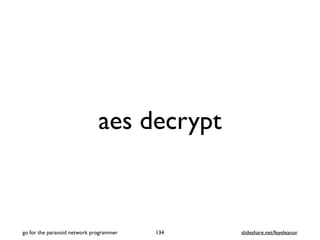
![package mai
n
import . "fmt
"
import "net
"
const AES_KEY = "0123456789012345
"
func main()
{
Dial(":1025", func(conn net.Conn) {
RequestMessage(conn, func(m []byte)
{
if m, e := Decrypt(m, AES_KEY); e == nil
{
Printf("%sn", m
)
}
}
)
}
)
}
func Dial(a string, f func(net.Conn))
{
// see udp reques
t
}
go for the paranoid network programmer slideshare.net/feyeleanor
135](https://image.slidesharecdn.com/gofortheparanoidnetworkprogrammer3rdedition-210218223621/85/Go-for-the-paranoid-network-programmer-3rd-edition-135-320.jpg)
![package mai
n
import . "fmt
"
import "net
"
const AES_KEY = "0123456789012345
"
func main()
{
Dial(":1025", func(conn net.Conn) {
RequestMessage(conn, func(m []byte) {
if m, e := Decrypt(m, AES_KEY); e == nil
{
Printf("%sn", m
)
}
}
)
}
)
}
func Dial(a string, f func(net.Conn))
{
// see udp reques
t
}
go for the paranoid network programmer slideshare.net/feyeleanor
136](https://image.slidesharecdn.com/gofortheparanoidnetworkprogrammer3rdedition-210218223621/85/Go-for-the-paranoid-network-programmer-3rd-edition-136-320.jpg)
![package mai
n
import . "fmt
"
import "net
"
const AES_KEY = "0123456789012345"
func main()
{
Dial(":1025", func(conn net.Conn) {
RequestMessage(conn, func(m []byte) {
if m, e := Decrypt(m, AES_KEY); e == nil
{
Printf("%sn", m
)
}
}
)
}
)
}
func Dial(a string, f func(net.Conn))
{
// see udp reques
t
}
go for the paranoid network programmer slideshare.net/feyeleanor
137](https://image.slidesharecdn.com/gofortheparanoidnetworkprogrammer3rdedition-210218223621/85/Go-for-the-paranoid-network-programmer-3rd-edition-137-320.jpg)
![package mai
n
import "net
"
func RequestMessage(conn net.Conn, f func([]byte)) (e error)
{
if _, e = conn.Write([]byte("n")); e == nil
{
m := make([]byte, 1024
)
var n in
t
if n, e = conn.Read(m); e == nil
{
f(m[:n]
)
}
}
retur
n
}
go for the paranoid network programmer slideshare.net/feyeleanor
138](https://image.slidesharecdn.com/gofortheparanoidnetworkprogrammer3rdedition-210218223621/85/Go-for-the-paranoid-network-programmer-3rd-edition-138-320.jpg)
![package mai
n
import "net
"
func RequestMessage(conn net.Conn, f func([]byte)) (e error)
{
if _, e = conn.Write([]byte("n")); e == nil
{
m := make([]byte, 1024
)
var n in
t
if n, e = conn.Read(m); e == nil
{
f(m[:n]
)
}
}
retur
n
}
go for the paranoid network programmer slideshare.net/feyeleanor
139](https://image.slidesharecdn.com/gofortheparanoidnetworkprogrammer3rdedition-210218223621/85/Go-for-the-paranoid-network-programmer-3rd-edition-139-320.jpg)
![package mai
n
import "net
"
func RequestMessage(conn net.Conn, f func([]byte)) (e error)
{
if _, e = conn.Write([]byte("n")); e == nil
{
m := make([]byte, 1024
)
var n in
t
if n, e = conn.Read(m); e == nil
{
f(m[:n]
)
}
}
retur
n
}
go for the paranoid network programmer slideshare.net/feyeleanor
140](https://image.slidesharecdn.com/gofortheparanoidnetworkprogrammer3rdedition-210218223621/85/Go-for-the-paranoid-network-programmer-3rd-edition-140-320.jpg)
![package mai
n
import "net
"
func RequestMessage(conn net.Conn, f func([]byte)) (e error)
{
if _, e = conn.Write([]byte("n")); e == nil
{
m := make([]byte, 1024
)
var n in
t
if n, e = conn.Read(m); e == nil
{
f(m[:n]
)
}
}
retur
n
}
go for the paranoid network programmer slideshare.net/feyeleanor
141](https://image.slidesharecdn.com/gofortheparanoidnetworkprogrammer3rdedition-210218223621/85/Go-for-the-paranoid-network-programmer-3rd-edition-141-320.jpg)
![package mai
n
import "net
"
func RequestMessage(conn net.Conn, f func([]byte)) (e error)
{
if _, e = conn.Write([]byte("n")); e == nil
{
m := make([]byte, 1024
)
var n in
t
if n, e = conn.Read(m); e == nil
{
f(m[:n]
)
}
}
retur
n
}
go for the paranoid network programmer slideshare.net/feyeleanor
142](https://image.slidesharecdn.com/gofortheparanoidnetworkprogrammer3rdedition-210218223621/85/Go-for-the-paranoid-network-programmer-3rd-edition-142-320.jpg)
![package mai
n
import "crypto/cipher
"
import "crypto/aes
"
func Decrypt(m []byte, k string) (r []byte, e error)
{
var b cipher.Bloc
k
if b, e = aes.NewCipher([]byte(k)); e == nil
{
var iv []byt
e
iv, m = Unpack(m
)
c := cipher.NewCBCDecrypter(b, iv
)
r = make([]byte, len(m)
)
c.CryptBlocks(r, m
)
}
retur
n
}
func Unpack(m []byte) (iv, r []byte)
{
return m[:aes.BlockSize], m[aes.BlockSize:
]
}
go for the paranoid network programmer slideshare.net/feyeleanor
143](https://image.slidesharecdn.com/gofortheparanoidnetworkprogrammer3rdedition-210218223621/85/Go-for-the-paranoid-network-programmer-3rd-edition-143-320.jpg)
![package mai
n
import "crypto/cipher
"
import "crypto/aes
"
func Decrypt(m []byte, k string) (r []byte, e error)
{
var b cipher.Bloc
k
if b, e = aes.NewCipher([]byte(k)); e == nil
{
var iv []byt
e
iv, m = Unpack(m
)
c := cipher.NewCBCDecrypter(b, iv
)
r = make([]byte, len(m)
)
c.CryptBlocks(r, m
)
}
retur
n
}
func Unpack(m []byte) (iv, r []byte)
{
return m[:aes.BlockSize], m[aes.BlockSize:
]
}
go for the paranoid network programmer slideshare.net/feyeleanor
144](https://image.slidesharecdn.com/gofortheparanoidnetworkprogrammer3rdedition-210218223621/85/Go-for-the-paranoid-network-programmer-3rd-edition-144-320.jpg)
![package mai
n
import "crypto/cipher
"
import "crypto/aes
"
func Decrypt(m []byte, k string) (r []byte, e error)
{
var b cipher.Bloc
k
if b, e = aes.NewCipher([]byte(k)); e == nil
{
var iv []byt
e
iv, m = Unpack(m
)
c := cipher.NewCBCDecrypter(b, iv
)
r = make([]byte, len(m)
)
c.CryptBlocks(r, m
)
}
retur
n
}
func Unpack(m []byte) (iv, r []byte)
{
return m[:aes.BlockSize], m[aes.BlockSize:
]
}
go for the paranoid network programmer slideshare.net/feyeleanor
145](https://image.slidesharecdn.com/gofortheparanoidnetworkprogrammer3rdedition-210218223621/85/Go-for-the-paranoid-network-programmer-3rd-edition-145-320.jpg)
![package mai
n
import "crypto/cipher
"
import "crypto/aes
"
func Decrypt(m []byte, k string) (r []byte, e error)
{
var b cipher.Bloc
k
if b, e = aes.NewCipher([]byte(k)); e == nil
{
var iv []byt
e
iv, m = Unpack(m
)
c := cipher.NewCBCDecrypter(b, iv
)
r = make([]byte, len(m)
)
c.CryptBlocks(r, m
)
}
retur
n
}
func Unpack(m []byte) (iv, r []byte)
{
return m[:aes.BlockSize], m[aes.BlockSize:
]
}
go for the paranoid network programmer slideshare.net/feyeleanor
146](https://image.slidesharecdn.com/gofortheparanoidnetworkprogrammer3rdedition-210218223621/85/Go-for-the-paranoid-network-programmer-3rd-edition-146-320.jpg)
![package mai
n
import "crypto/cipher
"
import "crypto/aes
"
func Decrypt(m []byte, k string) (r []byte, e error)
{
var b cipher.Bloc
k
if b, e = aes.NewCipher([]byte(k)); e == nil
{
var iv []byt
e
iv, m = Unpack(m
)
c := cipher.NewCBCDecrypter(b, iv
)
r = make([]byte, len(m)
)
c.CryptBlocks(r, m
)
}
retur
n
}
func Unpack(m []byte) (iv, r []byte)
{
return m[:aes.BlockSize], m[aes.BlockSize:
]
}
go for the paranoid network programmer slideshare.net/feyeleanor
147](https://image.slidesharecdn.com/gofortheparanoidnetworkprogrammer3rdedition-210218223621/85/Go-for-the-paranoid-network-programmer-3rd-edition-147-320.jpg)
![package mai
n
import "crypto/cipher
"
import "crypto/aes
"
func Decrypt(m []byte, k string) (r []byte, e error)
{
var b cipher.Bloc
k
if b, e = aes.NewCipher([]byte(k)); e == nil
{
var iv []byt
e
iv, m = Unpack(m
)
c := cipher.NewCBCDecrypter(b, iv
)
r = make([]byte, len(m)
)
c.CryptBlocks(r, m
)
}
retur
n
}
func Unpack(m []byte) (iv, r []byte)
{
return m[:aes.BlockSize], m[aes.BlockSize:
]
}
go for the paranoid network programmer slideshare.net/feyeleanor
148](https://image.slidesharecdn.com/gofortheparanoidnetworkprogrammer3rdedition-210218223621/85/Go-for-the-paranoid-network-programmer-3rd-edition-148-320.jpg)
![package mai
n
import "crypto/cipher
"
import "crypto/aes
"
func Decrypt(m []byte, k string) (r []byte, e error)
{
var b cipher.Bloc
k
if b, e = aes.NewCipher([]byte(k)); e == nil
{
var iv []byt
e
iv, m = Unpack(m
)
c := cipher.NewCBCDecrypter(b, iv
)
r = make([]byte, len(m)
)
c.CryptBlocks(r, m
)
}
retur
n
}
func Unpack(m []byte) (iv, r []byte)
{
return m[:aes.BlockSize], m[aes.BlockSize:
]
}
go for the paranoid network programmer slideshare.net/feyeleanor
149](https://image.slidesharecdn.com/gofortheparanoidnetworkprogrammer3rdedition-210218223621/85/Go-for-the-paranoid-network-programmer-3rd-edition-149-320.jpg)
![package mai
n
import "crypto/cipher
"
import "crypto/aes
"
func Decrypt(m []byte, k string) (r []byte, e error)
{
var b cipher.Bloc
k
if b, e = aes.NewCipher([]byte(k)); e == nil
{
var iv []byt
e
iv, m = Unpack(m
)
c := cipher.NewCBCDecrypter(b, iv
)
r = make([]byte, len(m)
)
c.CryptBlocks(r, m
)
}
retur
n
}
func Unpack(m []byte) (iv, r []byte)
{
return m[:aes.BlockSize], m[aes.BlockSize:
]
}
go for the paranoid network programmer slideshare.net/feyeleanor
150](https://image.slidesharecdn.com/gofortheparanoidnetworkprogrammer3rdedition-210218223621/85/Go-for-the-paranoid-network-programmer-3rd-edition-150-320.jpg)

![package mai
n
import . "bytes
"
import "crypto/rsa
"
import "encoding/gob
"
import "net
"
func main()
{
HELLO_WORLD := []byte("Hello World"
)
RSA_LABEL := []byte("served"
)
Listen(":1025", func(c *net.UDPConn, a *net.UDPAddr, b []byte) {
var key rsa.PublicKe
y
if e := gob.NewDecoder(NewBuffer(b)).Decode(&key); e == nil
{
if m, e := Encrypt(&key, HELLO_WORLD, RSA_LABEL); e == nil
{
c.WriteToUDP(m, a
)
}
}
retur
n
}
)
}
go for the paranoid network programmer slideshare.net/feyeleanor
152](https://image.slidesharecdn.com/gofortheparanoidnetworkprogrammer3rdedition-210218223621/85/Go-for-the-paranoid-network-programmer-3rd-edition-152-320.jpg)
![package mai
n
import . "bytes
"
import "crypto/rsa
"
import "encoding/gob
"
import "net
"
func main()
{
HELLO_WORLD := []byte("Hello World"
)
RSA_LABEL := []byte("served"
)
Listen(":1025", func(c *net.UDPConn, a *net.UDPAddr, b []byte) {
var key rsa.PublicKey
if e := gob.NewDecoder(NewBuffer(b)).Decode(&key); e == nil
{
if m, e := Encrypt(&key, HELLO_WORLD, RSA_LABEL); e == nil
{
c.WriteToUDP(m, a
)
}
}
retur
n
}
)
}
go for the paranoid network programmer slideshare.net/feyeleanor
153](https://image.slidesharecdn.com/gofortheparanoidnetworkprogrammer3rdedition-210218223621/85/Go-for-the-paranoid-network-programmer-3rd-edition-153-320.jpg)
![package mai
n
import . "bytes
"
import "crypto/rsa
"
import "encoding/gob
"
import "net
"
func main()
{
HELLO_WORLD := []byte("Hello World"
)
RSA_LABEL := []byte("served"
)
Listen(":1025", func(c *net.UDPConn, a *net.UDPAddr, b []byte) {
var key rsa.PublicKe
y
if e := gob.NewDecoder(NewBuffer(b)).Decode(&key); e == nil
{
if m, e := Encrypt(&key, HELLO_WORLD, RSA_LABEL); e == nil
{
c.WriteToUDP(m, a
)
}
}
retur
n
}
)
}
go for the paranoid network programmer slideshare.net/feyeleanor
154](https://image.slidesharecdn.com/gofortheparanoidnetworkprogrammer3rdedition-210218223621/85/Go-for-the-paranoid-network-programmer-3rd-edition-154-320.jpg)
![package mai
n
import . "bytes
"
import "crypto/rsa
"
import "encoding/gob
"
import "net
"
func main()
{
HELLO_WORLD := []byte("Hello World"
)
RSA_LABEL := []byte("served"
)
Listen(":1025", func(c *net.UDPConn, a *net.UDPAddr, b []byte) {
var key rsa.PublicKe
y
if e := gob.NewDecoder(NewBuffer(b)).Decode(&key); e == nil
{
if m, e := Encrypt(&key, HELLO_WORLD, RSA_LABEL); e == nil
{
c.WriteToUDP(m, a
)
}
}
retur
n
}
)
}
go for the paranoid network programmer slideshare.net/feyeleanor
155](https://image.slidesharecdn.com/gofortheparanoidnetworkprogrammer3rdedition-210218223621/85/Go-for-the-paranoid-network-programmer-3rd-edition-155-320.jpg)
![package mai
n
import . "bytes
"
import "crypto/rsa
"
import "encoding/gob
"
import "net
"
func main()
{
HELLO_WORLD := []byte("Hello World"
)
RSA_LABEL := []byte("served"
)
Listen(":1025", func(c *net.UDPConn, a *net.UDPAddr, b []byte) {
var key rsa.PublicKe
y
if e := gob.NewDecoder(NewBuffer(b)).Decode(&key); e == nil
{
if m, e := Encrypt(&key, HELLO_WORLD, RSA_LABEL); e == nil
{
c.WriteToUDP(m, a
)
}
}
retur
n
}
)
}
go for the paranoid network programmer slideshare.net/feyeleanor
156](https://image.slidesharecdn.com/gofortheparanoidnetworkprogrammer3rdedition-210218223621/85/Go-for-the-paranoid-network-programmer-3rd-edition-156-320.jpg)
![package mai
n
import . "bytes
"
import "crypto/rsa
"
import "encoding/gob
"
import "net
"
func main()
{
HELLO_WORLD := []byte("Hello World"
)
RSA_LABEL := []byte("served"
)
Listen(":1025", func(c *net.UDPConn, a *net.UDPAddr, b []byte) {
var key rsa.PublicKe
y
if e := gob.NewDecoder(NewBuffer(b)).Decode(&key); e == nil
{
if m, e := Encrypt(&key, HELLO_WORLD, RSA_LABEL); e == nil
{
c.WriteToUDP(m, a
)
}
}
retur
n
}
)
}
go for the paranoid network programmer slideshare.net/feyeleanor
157](https://image.slidesharecdn.com/gofortheparanoidnetworkprogrammer3rdedition-210218223621/85/Go-for-the-paranoid-network-programmer-3rd-edition-157-320.jpg)
![package mai
n
import . "bytes
"
import "crypto/rsa
"
import "encoding/gob
"
import "net
"
func main()
{
HELLO_WORLD := []byte("Hello World"
)
RSA_LABEL := []byte("served"
)
Listen(":1025", func(c *net.UDPConn, a *net.UDPAddr, b []byte) {
var key rsa.PublicKe
y
if e := gob.NewDecoder(NewBuffer(b)).Decode(&key); e == nil
{
if m, e := Encrypt(&key, HELLO_WORLD, RSA_LABEL); e == nil
{
c.WriteToUDP(m, a
)
}
}
retur
n
}
)
}
go for the paranoid network programmer slideshare.net/feyeleanor
158](https://image.slidesharecdn.com/gofortheparanoidnetworkprogrammer3rdedition-210218223621/85/Go-for-the-paranoid-network-programmer-3rd-edition-158-320.jpg)
![package mai
n
import "crypto/rand
"
import "crypto/rsa
"
import "crypto/sha1
"
func Encrypt(key *rsa.PublicKey, m, l []byte) ([]byte, error)
{
return rsa.EncryptOAEP(sha1.New(), rand.Reader, key, m, l
)
}
go for the paranoid network programmer slideshare.net/feyeleanor
159](https://image.slidesharecdn.com/gofortheparanoidnetworkprogrammer3rdedition-210218223621/85/Go-for-the-paranoid-network-programmer-3rd-edition-159-320.jpg)
![package mai
n
import "crypto/rand
"
import "crypto/rsa
"
import "crypto/sha1
"
func Encrypt(key *rsa.PublicKey, m, l []byte) ([]byte, error)
{
return rsa.EncryptOAEP(sha1.New(), rand.Reader, key, m, l
)
}
go for the paranoid network programmer slideshare.net/feyeleanor
160](https://image.slidesharecdn.com/gofortheparanoidnetworkprogrammer3rdedition-210218223621/85/Go-for-the-paranoid-network-programmer-3rd-edition-160-320.jpg)
![package mai
n
import "crypto/rand
"
import "crypto/rsa
"
import "crypto/sha1
"
func Encrypt(key *rsa.PublicKey, m, l []byte) ([]byte, error)
{
return rsa.EncryptOAEP(sha1.New(), rand.Reader, key, m, l
)
}
go for the paranoid network programmer slideshare.net/feyeleanor
161](https://image.slidesharecdn.com/gofortheparanoidnetworkprogrammer3rdedition-210218223621/85/Go-for-the-paranoid-network-programmer-3rd-edition-161-320.jpg)
![package mai
n
import "crypto/rand
"
import "crypto/rsa
"
import "crypto/sha1
"
func Encrypt(key *rsa.PublicKey, m, l []byte) ([]byte, error)
{
return rsa.EncryptOAEP(sha1.New(), rand.Reader, key, m, l
)
}
go for the paranoid network programmer slideshare.net/feyeleanor
162](https://image.slidesharecdn.com/gofortheparanoidnetworkprogrammer3rdedition-210218223621/85/Go-for-the-paranoid-network-programmer-3rd-edition-162-320.jpg)
![package mai
n
import "crypto/rand
"
import "crypto/rsa
"
import "crypto/sha1
"
func Encrypt(key *rsa.PublicKey, m, l []byte) ([]byte, error)
{
return rsa.EncryptOAEP(sha1.New(), rand.Reader, key, m, l
)
}
go for the paranoid network programmer slideshare.net/feyeleanor
163](https://image.slidesharecdn.com/gofortheparanoidnetworkprogrammer3rdedition-210218223621/85/Go-for-the-paranoid-network-programmer-3rd-edition-163-320.jpg)
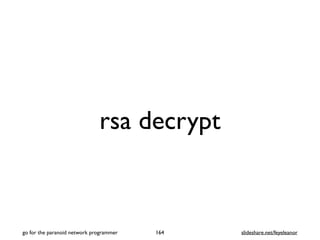
![package mai
n
import "crypto/rsa
"
import . "fmt
"
import "net
"
func main()
{
Dial(":1025", "ckey", func(c *net.UDPConn, k *rsa.PrivateKey) {
if m, e := ReadStream(c); e == nil
{
if m, e := Decrypt(k, m, []byte("served")); e == nil
{
Println(string(m)
)
}
}
}
)
}
go for the paranoid network programmer slideshare.net/feyeleanor
165](https://image.slidesharecdn.com/gofortheparanoidnetworkprogrammer3rdedition-210218223621/85/Go-for-the-paranoid-network-programmer-3rd-edition-165-320.jpg)
![package mai
n
import "crypto/rsa
"
import . "fmt
"
import "net
"
func main()
{
Dial(":1025", "ckey", func(c *net.UDPConn, k *rsa.PrivateKey)
{
if m, e := ReadStream(c); e == nil
{
if m, e := Decrypt(k, m, []byte("served")); e == nil
{
Println(string(m)
)
}
}
}
)
}
go for the paranoid network programmer slideshare.net/feyeleanor
166](https://image.slidesharecdn.com/gofortheparanoidnetworkprogrammer3rdedition-210218223621/85/Go-for-the-paranoid-network-programmer-3rd-edition-166-320.jpg)
![package mai
n
import "crypto/rand
"
import "crypto/rsa
"
import "crypto/sha1
"
func Decrypt(key *rsa.PrivateKey, m, l []byte) ([]byte, error)
{
return rsa.DecryptOAEP(sha1.New(), rand.Reader, key, m, l
)
}
go for the paranoid network programmer slideshare.net/feyeleanor
167](https://image.slidesharecdn.com/gofortheparanoidnetworkprogrammer3rdedition-210218223621/85/Go-for-the-paranoid-network-programmer-3rd-edition-167-320.jpg)
![package mai
n
import "crypto/rsa
"
import . "fmt
"
import "net
"
func main()
{
Dial(":1025", "ckey", func(c *net.UDPConn, k *rsa.PrivateKey)
{
if m, e := ReadStream(c); e == nil
{
if m, e := Decrypt(k, m, []byte("served")); e == nil
{
Println(string(m)
)
}
}
}
)
}
go for the paranoid network programmer slideshare.net/feyeleanor
168](https://image.slidesharecdn.com/gofortheparanoidnetworkprogrammer3rdedition-210218223621/85/Go-for-the-paranoid-network-programmer-3rd-edition-168-320.jpg)
![package mai
n
import "crypto/rsa
"
import . "fmt
"
import "net
"
func main()
{
Dial(":1025", "ckey", func(c *net.UDPConn, k *rsa.PrivateKey) {
if m, e := ReadStream(c); e == nil
{
if m, e := Decrypt(k, m, []byte("served")); e == nil
{
Println(string(m)
)
}
}
}
)
}
go for the paranoid network programmer slideshare.net/feyeleanor
169](https://image.slidesharecdn.com/gofortheparanoidnetworkprogrammer3rdedition-210218223621/85/Go-for-the-paranoid-network-programmer-3rd-edition-169-320.jpg)
